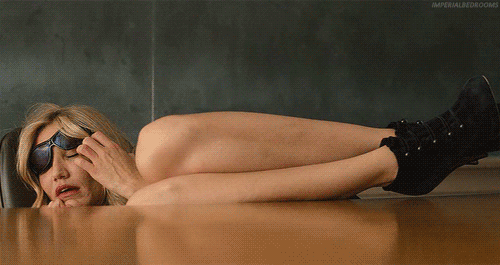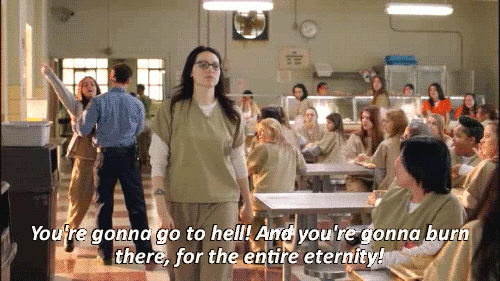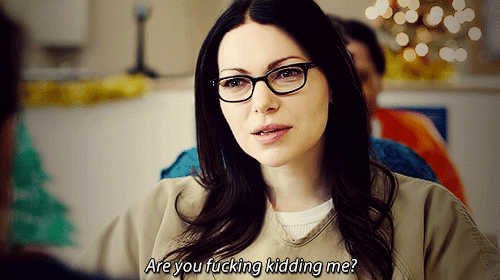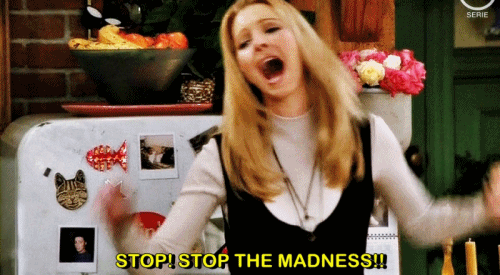
Sober in the City: An Atheist Walks into AA
Feature Image via Bustle
I’m an atheist, so it’s pretty ironic that my epic celebration of Easter Sunday 2008 is what ultimately landed me in an AA meeting. On that fateful Sunday, my biological mother (I was adopted because she was a crack addict — a shit show of a story that I will save for later) came into the city to take me out for drunk brunch, an activity that seemed to be the only thing we could bond over because being sober while listening to her justify her abusive behavior was soul-crushing. We started off with the usual: bottomless mimosas. This turned into an afternoon of bar hopping. After she went home, my partner and I invited friends over to our apartment and we continued to drink… until around 8am-ISH.
Still drunk as the morning sun crept into my living room, I sent an e-mail to my employer requesting a sick day. (Yes, I was one of those people who came to work with colds and flus because I would use up all of my sick days to sleep off hangovers. Although I guess I was always technically sick, but in a different way.) After hitting send, I stuffed my face with a bunch of food and fell asleep. Hours later, I woke up crying. I had promised myself time and time again that I would quit partying so hard, that I would drink in moderation. And yet, here I was… AGAIN.

via Rap Genius
For the first time, I admitted I needed help. I picked up the phone and started calling substance abuse treatment centers and organizations. All of them wanted me to make an appointment, bring in my insurance card, and jump through a bunch of hoops. But, I knew that if I waited another day, the lure of vodka and good company would convince me that I in fact did not need the help that I was so desperately seeking in that moment of clarity. Throughout the day, I alternated between making calls, crying, and sleeping, until my quest eventually led me to an organization of volunteers who assist people with finding AA meetings convenient to their schedule and location. The person on the other end of the phone told me to get dressed ASAP and go to a meeting in a nearby neighborhood that would be starting soon.
I was reluctant, but I threw on a pair of pants, some sneakers, and a dirty sweatshirt and headed to the address provided. I was a bit confused when I first arrived. From the outside, the space was dimly lit, almost like a bar. I was such an addict at the time that I thought, hell, if it is a bar and I’m at the wrong place, I’ll just have a drink. But, it wasn’t a bar. It was the coolest AA meeting, nothing like I envisioned AA to be. The members dim the lights to give it a nice, relaxed vibe. Between the lighting and the stories, I was hooked. AA is where I needed to be. I finally found home. Until…

via WiffleGif
After a few weeks, some of the members started asking me if I had a sponsor, if I believed in a “higher power,” and if I was working the 12 steps. I was told that I was focusing too much on the “problem” and not enough on “solution.” They warned me about the perils of becoming a dry drunk: a person who basically engages in the same destructive alcoholic behaviors, only without actually drinking. These behaviors could ruin my life just the same as if I were on the sauce. Furthermore, they said dry drunks ran a greater risk of relapsing, which of course would exacerbate existing problems, or worse, lead to death.
These messages really resonated with me. I did have many character defects I wanted to address. There were behaviors I wanted to change. I was ready to stop the shenanigans and work on solution. But where to start? Therapy? Shall we talk about how my crack addict mother abandoned me, leaving me behind to live with my sexually abusive stepfather until the courts awarded my grandparents custody of me when I was 14? Maybe I should explore the feelings I had about my grandfather also being a raging alcoholic who would rip doors off of hinges when he was wasted? Or my grandmother dying when I was 17 and how, since high school, I supported myself and buried all of this pain as I plowed through college and grad school? Perhaps I might want to examine why I shacked up with another addict who constantly encouraged me to stay wasted? Also helpful might be researching the genetic component of alcoholism and addiction, since it seemed to run in my family?
“No,” the fellowship said! None of this mattered. I could talk about these factors and process in meetings. But, ultimately, I needed to follow the guidelines in the Big Book (the complete text of Alcoholics Anonymous) to the letter, or else I would fail! And, according to the Big Book:
If, when you honestly want to, you find you cannot quit entirely, or if when drinking, you have little control over the amount you take, you are probably alcoholic. If that be the case, you may be suffering from an illness which only a spiritual experience will conquer… Lack of power, that was our dilemma. We had to find a power by which we could live, and it had to be a Power greater than ourselves. Obviously. But where and how were we to find this Power?
Well, that’s exactly what this book is about. Its main object is to enable you to find a Power greater than yourself which will solve your problem. That means we have written a book which we believe to be spiritual as well as moral. And it means, of course, that we are going to talk about God.
…we decided that hereafter in this drama of life, God was going to be our Director. He is the Principal; we are His agents. He is the Father, and we are His children. Most good ideas are simple, and this concept was the keystone of the new and triumphant arch through which we passed to freedom.
Obviously? The only thing obvious to me was the book’s sexism, misogyny, and victim blaming. It didn’t matter that I was molested or grew up in a home where I was exposed to drug use. Nor did it matter that I may have been dealt a bad genetic hand and possibly predisposed to addiction. All that mattered was that, according to the program, I was “spiritually bankrupt” and needed God to set me on the right path.

via Fan Pop
So many problems with this, I don’t even know where to begin. I’m going to save the sexism and misogyny for another post and start with the fact that I’m an atheist. Even if I did believe in God, I simply cannot ignore all of the burgeoning scientific explanations of alcoholism that include a number of biopsychosocial factors outside of religiosity or lack thereof. There are plenty of atheists who are not addicts, so being “spiritually bankrupt” could not possibly be the only explanation for my alcoholism. Thus, finding God could not possibly be the only solution.
My skepticism was met with condescending reassurance. Members instructed me to believe in anything greater than myself, and that soon, if open to it, I would eventually believe in God. They advised that I pray to anything, even a radiator (yes, a radiator) and to read the chapter “We Agnostics” in the Big Book, which includes passages such as:
To be doomed to an alcoholic death or to live on a spiritual basis are not always easy alternatives to face. But it isn’t so difficult. About half our original fellowship were of exactly that type. At first some of us tried to avoid the issue, hoping against hope we were not true alcoholics. But after a while we had to face the fact that we must find a spiritual basis of life – or else.
…We needed to ask ourselves but one short question. ‘Do I now believe, or am I even willing to believe that there is a Power greater than myself?’ As soon as a man can say that he does believe, or is willing to believe, we empathetically assure him that he is on his way.
Oh, fantastic! I must submit to a God (they soften the blow by allowing it to be any God) or be doomed to an alcoholic death. It sounded a bit too much like “pray the gay away.” You know, like I was choosing to be an alcoholic, like I chose to be gay, because I was “spiritually bankrupt” and all I needed to do was find God to cure me of all my moral failures. (By the way, I’m not likening homosexuality to alcoholism as Rick Perry does. Being gay is not a bad thing, and it was not ruining my life the way alcohol was. I just do not believe that either are “moral failures” that can be cured by praying to a God that I do not believe in.)
The fellowship said I was thinking too hard about it, that I was stubborn, and that I was not willing to admit that there were forces bigger than me. What they didn’t get was that I did believe there were forces beyond my control, powers bigger than me. Let’s just take gravity as one of many examples. I just don’t believe that praying to gravity or the radiator or the ocean would cure me of my alcoholism. Sure, meditation could be one tool to alleviate stress and perhaps make me a better person. But, to literally turn my will and life over to the care of a radiator until I could find God? Uh, not going to be effective for me!
Some people were really supportive. They would point to a sign on the wall that read “There’s No Right Way to Get Sober,” or share AA slogans like, “Take what you need and leave the rest.” All helpful, until I would be asked to speak at a meeting and members would respond, “I use to be like you. Lost. Godless. But, don’t worry. You’ll ‘get it.'” I became increasingly resentful. And, I was told that my resentment was due to my unwillingness to accept God. It was not feasible to them that, perhaps for some, God isn’t real, alcoholism is real, and that there may be a way of treating addiction without shaming people into believing that there is an omnipotent being invested in our daily drink consumption.
But, here was the problem: Despite all of my issues with AA — sexual predators, verbal abuse, misogyny, sexism, racism, classism, homophobia, and victim blaming — it seemed to be the only thing keeping me sober. So, I’m not writing this to deter anyone from seeking out AA if they feel they need help. Rather, I would like to see more inclusive, progressive versions of AA. As a study published in the Journal of Studies on Alcohol and Drugs concluded:
God belief appears to be relatively unimportant in deriving AA-related benefit, but atheist and agnostic clients are less likely to initiate and sustain AA attendance relative to spiritual and religious clients. This apparent reticence to affiliate with AA ought to be clinically recognized when encouraging AA participation.
I, like many other atheists, stopped regularly attending meetings, with the exception of a few queer-friendly meetings from time to time. Still, I’ve maintained my sobriety for five years and three months to date.
In February 2014, The New York Times ran an article titled, “Alcoholics Anonymous, Without the Religion,” which documented stories of individuals like me seeking alternative versions of traditional AA. Take Glenn’s story, for example:
When he first went to an A.A. meeting 27 years ago, he found himself confronted by religious language and ritual that he considered anathema. Desperate to stop drinking, he tried to fit in. ‘They had this fake-it-till-you-make-it attitude,’ recalled Glenn, 72. ‘This feeling that the religion will catch up with you. It worked in the sense that I got sober. But I got weary of it. It felt mindless.’ After 10 years without alcohol, Glenn ordered a glass of wine and spent the next five years suffering from what he wryly diagnoses now as ‘the merlot flu.’
And Dorothy:
‘A.A. starts at its core with honesty,’ said Dorothy, 39, who heads the steering committee for the We Agnostics and Freethinkers International A.A. Convention.’ And how can you be honest in recovery if you’re not honest in your own beliefs? If you don’t believe in the God they’re praying to, that’s not honest practice.’
Good question, Dorothy! I may just check out one of these meetings. However, not all of us atheist and agnostic queers are so lucky to have such meetings available in our respective cities. And, about that sexist, misogynist Big Book…
